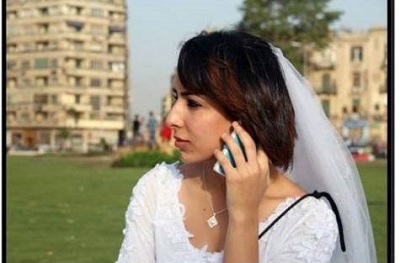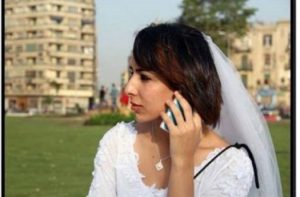
Egyptian interior designer Samah Hamdi wearing a wedding dress in Cairo streets as a way to challenge society’s perception of unmaried women. (Photo: Ahmad Al Sabbah)
Cairo, 1 Rabi’ul Akhir 1436 | January 22, 2015 (MINA) – Haunted by society’s negative stereotyping of unmarried women, Samah Hamdi, an Egyptian interior designer, decided to make a defiant public statement. She wore a white wedding dress and went about her daily life routine in the Egyptian capital.
Hamdi, 26, walked in central Cairo, rode the city’s subway, went window-shopping and to work in the attire, Gulfnews quoted by Mi’raj Islamic News Agency (MINA) as reporting.
“I am opposed to reducing the existence of the girl to marriage only and to the common notion if that if she does not get married, then this is a disaster,” Hamadi says. “The girl is too great to be underestimated to the mould of the bride girl. We are all the time cast in a certain stereotype — that the ultimate aim of any girl’s life is to get married and that if she goes beyond a certain age limit without marriage, she becomes a spinster.”
Women in conservative Egypt are often defined by marriage and family, regardless of any professional or academic success they may achieve, said Hamdi.
Also Read: Israeli Airstrike Attacks Lebanon, One Civilian Killed and Six Injured
“I put on the wedding dress and went to all places to which I go on an ordinary day,” Hamdi told private TV station Al Mehwar Monday night. “I spent a real full day out on the street and behaved normally. But it was the people who did not behave well.”
Hamdi captured her behaviour and the public’s reaction in a prize-winning video and photos shot by two friends. “The video was filmed on several days. Initially, my aim was to confront society out in the street and send a message that I do not care about its moulding of women.”
Hamdi, who is also studying for a master’s degree, says her behaviour stunned most people.
“On seeing me wearing the wedding dress, women looked shocked and started to whisper among themselves. Street vendors, meanwhile, reacted in a derisive and crude way, which involved verbal sexual harassment.”
Also Read: Houthi Chief of Staff Killed in US–Israeli Airstrikes on Yemen
In the five-minute video that went viral, some peddlers in central Cairo who, on seeing Hamdi in the outfit, satirically let out joy cries, an Egyptian tradition linked to wedding ceremonies. “On the subway, some people thought I am a bride, who needs money and some tried to help me.”
The footage along with the photos were shown at a competition in November last year at the Cairo Opera House where they were awarded a prize.
“Through this artistic work, I tried to tell people that OK I’ve worn the dress you always want every girl to don. Will you then allow me to pursue my ambitions?”
The answer, according to Hamdi, was No.
Also Read: Trump Announces Start of Phase Two in Gaza Ceasefire Deal
“This was the way the people liked me to look like. And when I did, they refused to accept me. People continue to look at the girl as being an object to fulfil their desires regardless of her feelings or ambitions.”
However, Hamdi says that the majority of online comments was positive.
“Most girls said that what I did was something bold and a protest cry against society’s demeaning view of the woman,” she said. “Still, the feedback from men was negative. They are not ready to accept a girl, who challenges their domination.”
Nearly nine million Egyptians at the age of 33, half of them women, are not married, according to 2011 official figures.
Also Read: Iran Slams Trump, Calls US the World’s Biggest Sponsor of Terrorism
The problem in Egypt is believed to have worsened due to economic woes, including high unemployment rates — estimated by the government to be at 13.4 per cent of the workforce — since the ouster of long-time president Hosni Mubarak following a 2011 uprising. Women mainly bear the brunt, according to experts.
“The girl is under pressure all the time from society,” said Hala Hamad, a psychiatrist. “Her relatives and colleagues at work often ask her why she has not got married and what has gone wrong. The problem becomes more painful if the girl exceeds the age of 30 without getting a husband,” she added. “Under this enormous pressure, the girl may fall into depression or accept any man as a husband only to please her family. This makes her feel she is an inferior human being.”(T/P009/P3)
Mi’raj Islamic News Agency (MINA)
Also Read: Trump Says Focus Is on Rebuilding Gaza, Not on Two-State Solution
































 Mina Indonesia
Mina Indonesia Mina Arabic
Mina Arabic